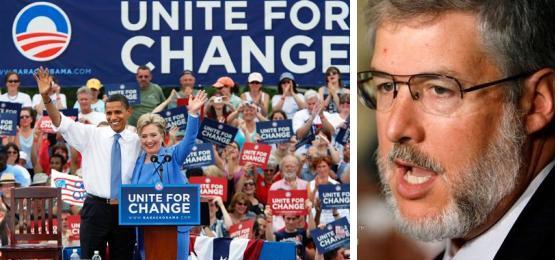UNITY VS. "The Unitary Theory of the Executive": An 'Open Source' Philosophy Of Government, Commerce & Innovation - MediaBizBuzz for June 30

If last week were a novel, it'd be a page-turning summer blockbuster. It all began on Monday with the return of eminence grise Jim Hansen, twenty years to the day since he first testified before Congress on Global Warming. And it ended with Bill Gates riding off into the philanthropic sunset as the stock market took a nosedive. In between there were a raft of Supreme Court decisions - among them the unbanning of DC's handgun ban and the disallowing of punitive damages for Exxon-Valdez -- not to mention the joint appearance of Obama and Clinton in (too on-the-nose) Unity, New Hampshire. Challenging the dominant -- and proprietary -- hold of WindowsMobile, RIM, and Apple, Nokia bought out Symbian, vowing to offer its OS free by 2010, not quite Linux-open-source, but still a vast improvement on how mobile biz is done. Publicis, too, is changing the game -- putting together an ad network with the four big ad servers, AOL/Platform A, Google/DoubleClick, Yahoo, and Microsoft -- viewing the effort as complementary. Not that binary thinking was by any means obsolete - Vice President Cheney's Chief of Staff David Addington appeared before Congress and he could not have been more contemptuous, going so far as to deny any grasp, much less ownership, of the "theory of the unitary executive." And, not even five months after the end of the Writers Strike, Hollywood is again on tenderhooks with tonight's midnight SAG strike deadline. Consider: Isn't finding common ground in our best interest?
Is It Warm In Here, Or Is It Just Me?
Jim Hansen pulled no punches during his Monday appearance before the House Select Committee on Energy Independence and Global Warming, going so far as to charge Big Coal with crimes against humanity. In parallel, the Aspen Global Change Institute presented Forecast 2030: Planning for a Change in Climate, where Dr. Lisa Goddard admitted that it's easier to predict long-term models over short. Andrew Revkin, who covers the climate change beat for the New York Times in his Dot Earth blog, has an even-handed piece on what's really happening to the sea ice at the North Pole. For an insider's account of Jim Hansen's tempestuous tenure at NASA, check out journalist Mark Bowen's Censoring Science. And it's noteworthy that while Hansen couldn't shame the Senate into passing its global warming bill, California under Gov. Schwarzenegger's leadership is moving forward with its own cap-and-trade plan.
Open The Gates
Much ado over Bill Gates' adieu at MSFT. The Economist's cover story is a bit squishy - trumpeting Live Mesh as an astute way to challenge Google's foray into cloud computing; color me unconvinced. Reuters looks at Gates' successor, Steve Ballmer (he of the "scary" management style according to a Gartner analyst). VentureBeat reports that MSFT has acquired Powerset (which uses natural language processing in search) for $100M; TechCrunch asserts, "not yet it hasn't." The SF Chronicle looks at the Gates Foundation and its laser-like focus on health. Earlier this year Fortune profiled Melinda Gates, the great woman behind the man. And, oh yeah, today's the last day you can get your hands on XP.
The Revolution Is Being Televised
This year Emmy let us see them making the sausages - to some extent. Perhaps to distract from Strike Talk or hype the start of Awards season, the Emmys announced their shortlist for drama and comedy nominees, instantly creating discussion around snubbed shows and stars. (Leaving Battlestar Galactica off the list will be apocalyptic news to many, and How I Met Your Mother's absence - explain that to the comedy gods. But in all fairness, if either Damages or Mad Men receive the nod, it'll be a first for basic cable.) Despite coverage to the contrary it appears that SAG is not moving towards a Strike Authorization Vote - L.A. Weekly's Nikke Finke had that scoop on Sunday, which was confirmed by SAG prexy Alan Rosenberg. Might George Clooney be of service?
A Magna Global study is parsed six ways to Sunday: MediaWeek dutifully reports that DVR usage now accounts for nine percent of national ratings. Silicon Alley Insider has a more sobering takeaway: For the first year, the average age of the TV viewer is now a mature Five-Oh -- too old for advertisers? Analysts ask: Was that Viacom/CBS split wrong-headed? (The Bernstein white paper is entitled A Bad Plan, Poorly Executed, no less) Should Sumner take the company private? Hitwise reports that for four weeks in a row PBS has overtaken all broadcast networks online. It has 24.23% audience share, with ABC following at 19.35%. Either tweens are ogling Jim Lehrer or this confounds exactly who watches TV online. Speaking of which, since we find outselves migrating to online video, our Shelly Palmer offers standards for a quality online viewing experience. PaidContent's Rafat Ali has issues with NBC's Olympic broadcast policies. According to the AP "no video of Olympic events is permitted to be shown on any website besides NBCOlympics.com" said clips will be available online until after they are seen on TV. Looks like commerce trumps the promise of global fraternite. And: Recession be damned; the cable upfronts rake in $8B, up 8-10% over last year.
Mobile's On the Go!
BusinessWeek has Kudos for the iPhone for jumpstarting the smartphone market. Thanks to it's validation of the space there's momentum for all sorts of deals. Among them: BW deems the Nokia acquisition of Symbian shrewd, noting that it will create healthy competition not only between WindowsMobile, RIM, and Apple, but for Android -- Google's hotly anticipated open source mobile platform. Virgin Mobile USA snaps up Helio for $39M in stock; MocoNews.net has an interview with Virgin's Dan Schulman on said acquisition. The generally astute TechDirt thinks that this is the nail in the coffin for MVNOs.
Yes, Virginia, even head-to-head rivals can come together. Following the lead of the Markle Foundation, MSFT, Google, AARP, Consumers Union, WebMd, MedicAlert, and BlueCross BlueShield have agreed on a set of principles for privacy standards to protect patients' information, beating Congress to the punch as that body begins debating electronic pesonal health records. Would this have been possible if Gates hadn't seen the bigger picture in World Health?


